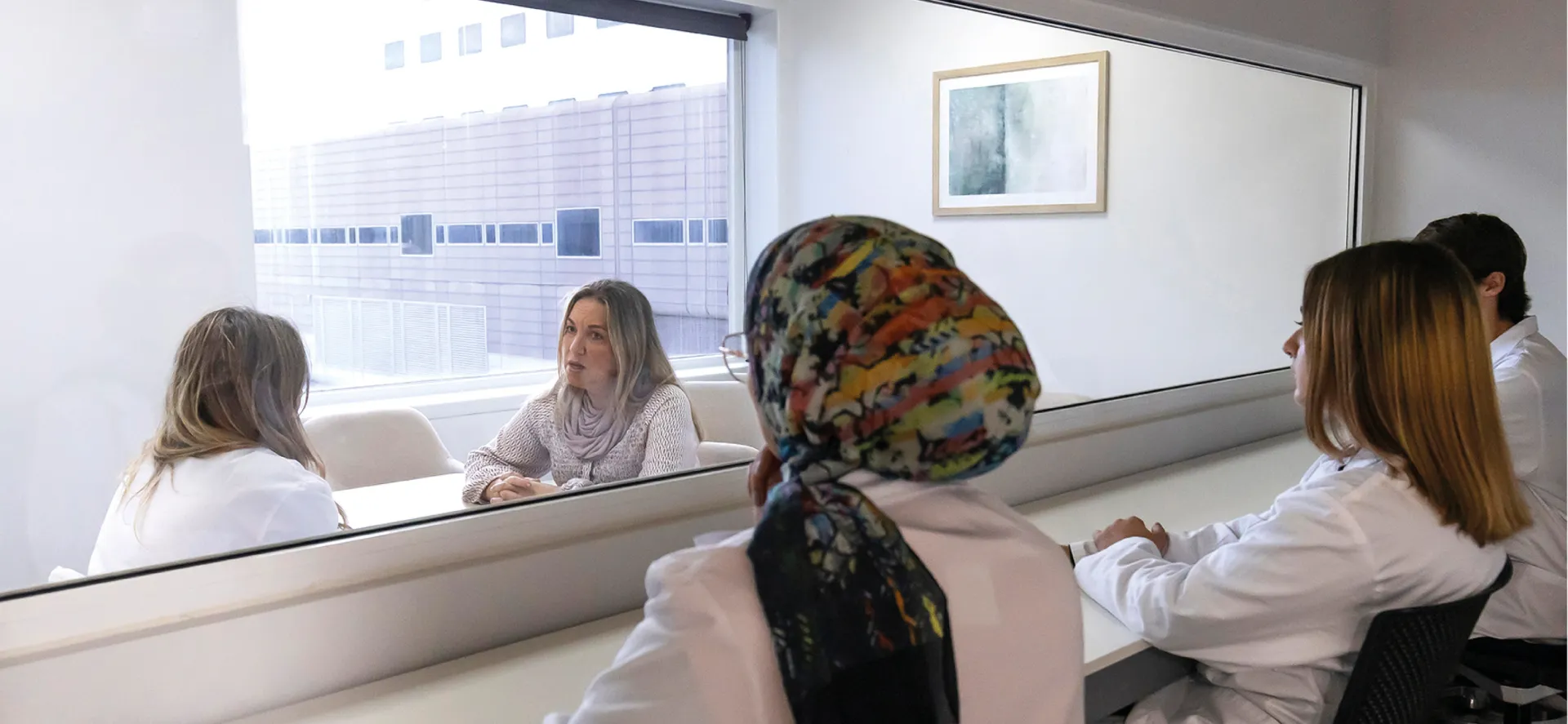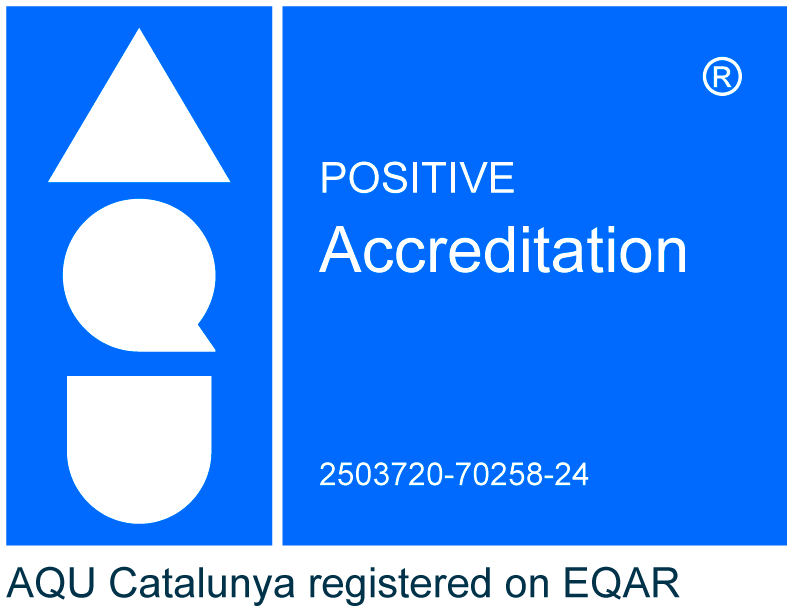Bachelor’s Degree in Psychology
Home
- Type of programme
- Official degrees
- Campus
- Campus Sant Cugat
- Duration
- 8 semesters
- Credits
- 240 ECTS
- Schedule
- Morning and afternoon
- Language
- Catalan and Spanish
- Places
- 60
- Modality
- On site
Why study Psychology at UIC Barcelona?
The Bachelor’s Degree in Psychology at UIC Barcelona prepares you to meet the mental health demands of today’s society with skill and excellence. You will learn to understand psychological functioning and develop solutions that help improve people’s quality of life through scientifically-validated intervention methods.
Starting in year one, you will receive both theoretical and competency-based training and gain practical experience at Support, our own psychology and psychiatry clinic. And all this within a holistic and humanistic approach.
- Practical training from year one at Support
120 hours of real-case observation at Support, our psychology and psychiatry clinic, providing 33% more practical training within the degree. A real-world environment in which to apply knowledge and develop practical skills.
- Innovative and active methodology
We use case analysis and simulation with actors, as well as technological tools such as virtual reality devices, chatbots and other AI-based resources to develop students’ professional competencies.
- Assessment through OSCEs
We are the first Psychology degree to incorporate competency-based assessment through Objective Structured Clinical Examinations (OSCEs). At the end of each academic year, students are assessed through interactions with actors simulating situations related to real-world professional scenarios.
- Preparation for the PIR
Right from day one, we work with readings and assessments adapted to the PIR methodology, ensuring advanced preparation for students who wish to pursue a career in clinical psychology.
- Teaching staff
Our teaching staff is committed to a humanistic approach to professional practice. Not only does this enrich their teaching, but it also gives students the opportunity to observe lecturers in real professional settings, either at Support or during the year-four practicum.
- International and interdisciplinary environment
The Sant Cugat Health Campus fosters synergies with Medicine, Nursing, Dentistry and Physiotherapy. We also offer double degrees with Nursing and Education. Campus life offers an international experience, allowing students to share daily life with students from different cultures and take part in mobility programmes during the summer and/or the year four.
The Degree of Psychology in numbers
Testimonials
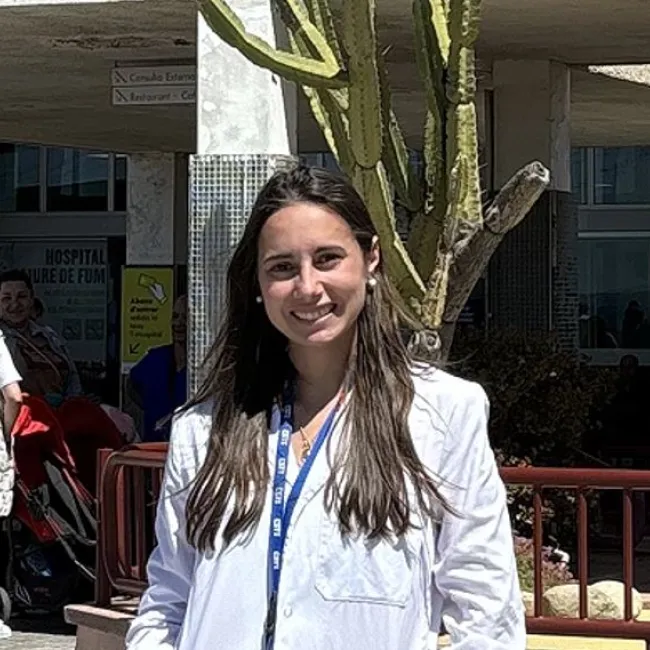
Choosing UIC Barcelona for my training as a psychologist was one of the best decisions I have ever made, not only because of the high academic quality offered by the teaching team, but also because of the values it promotes and the environment it creates for its students. What stands out most is having had the opportunity to observe real clinical cases from the first year of the bachelor’s degree through the Support University Psychology and Psychiatry Clinic, since it offers students the possibility to start developing skills and competencies necessary for the profession. I would also like to mention the personal and high quality attention I have received, feeling supported throughout my training. My studies have given me a solid foundation and preparation, which has allowed me to gain a position as Resident Internal Psychologist (PIR) in the Consorci Sanitari de Terrassa, an institution with which UIC Barcelona collaborates. This achievement is the result of hard work and the excellent education I received at UIC Barcelona.

I decided to study psychology at UIC Barcelona because of the privilege of practicing on real cases from year 1. Also because of my personal relationship with the lecturers and how they prepare you for the Resident Psychologist exam from day one.

The reason why I chose UIC Barcelona was because its health degrees had good references. Now that I have been studying the Degree in Psychology for one year at UIC Barcelona, there are several aspects that I love about studying here: for me, it has been a luxury and great opportunity to combine theory and practice from the first year, being able to see real cases brings us closer to our future profession and, at the same time, helps us to see if this is really the job we want. I would also highlight the lecturers' friendliness and flexibility. And, lastly, my classmates. In general, there is a good vibe and team spirit.
Collaborations
At UIC Barcelona, we offer three areas of collaboration: health, business and organizations, and education. Through clinics, healthcare centers, businesses, and educational institutions, we provide practical experiences that strengthen your training and connect you with the professional world from the very beginning.
You will develop key skills in real-world settings, gaining a broad and applied understanding of psychology in different contexts.
Find out more about these three collaboration areas in the internship section.
Presentation
Bachelor’s Degree in Psychology with three ingredients: scientific rigour, guidance for professional practice and comprehensive education for students
In a social environment in which psychological help is increasingly required, the Bachelor’s Degree in Psychology from UIC Barcelona will help professionals acquire the scientific knowledge that is necessary to analyse, understand, interpret and explain human behaviour.
This degree also allows students to learn basic skills and abilities in the university’s own Psychology Clinic where they will evaluate and intervene at an individual and social level throughout the life cycle. The purpose of this is to promote and improve people’s health and quality of life and prevent physical and mental illnesses through specific interventions.
All students finish the Bachelor’s Degree with the Health Psychology major.
Reasons to take this Bachelor’s Degree at UIC Barcelona. Observation of real cases from the first year in our own clinic
UIC Barcelona has its own Psychology and Psychiatry clinic (SUPPORT), for our Bachelor’s degree in Psychology.
Teaching innovation
The curricular design ensures that subjects which are closely related to each other are linked through shared practical cases and a high number of workshops in small groups.
Higher education guidance
Preparation for the official PIR exam from first year onwards and access to master’s degrees in the various specialisations.
Campuses and multidisciplinary team
You will study on our Healthcare Campus, in a hospital and multidisciplinary university environment.You will also receive an interdisciplinary qualification, learning alongside teams of doctors, nurses, dentists, and physiotherapists.
Prospective students
Anyone who fulfils the admission requirements and general prerequisites for access to the degree programme may apply.. On the other hand, the following skills should also be underlined:
- An interest in helping people and the community
- Emotional balance and empathy
- The ability to self-reflect and be self-critical
- The ability to observe, analyse and synthesise
- Responsibility and a strong work ethic
- The ability to organise and plan
- An interest in research
- The ability to work in a team and cooperate with other professionals
Objectives and competences achieved by outgoing students
- You will acquire the knowledge that defines and organises psychology into a scientific discipline, including its theories, methods and areas of application. Additionally, you will learn how to apply it in order to identify and resolve problems in the field of psychology.
- You will be able to work in a general professional context and join Master’s degree programmes that will provide you with a more advanced education aimed at academic, professional or research specialisation in the area of psychology.
- You will gather and interpret significant data on human, individual and social behaviour within the context it is produced in, in order to issue judgements about problems that are psychological in nature.
- You will obtain psychology-specific competences that promote the mental health of individuals and social groups, and address physical and mental illness through specific interventions.
- You will be capable of transmitting ideas and solutions on issues related to human behaviour, for both specialist and non-specialist audiences.
- You will learn how to tackle educational and professional activities based on respect for the profession’s ethical code, which, among other more specific items, includes the principal of respecting and promoting people’s fundamental human rights, equality, the principle of universal access for all people and the democratic values of a culture of peace.
- You will acquire an anthropological grounding that will allow you to always interact in an ethical way with people, families and other professionals while taking human dignity into account in all situations.
All of these objectives will be achieved through the deployment of the basic, general, cross-disciplinary and specific competences acquired through the Bachelor's Degree in Psychology. The Bachelor’s degree allows you to take general psychology classes.
Academic accreditation
Graduat o Graduada en Psicologia per la Universitat Internacional de Catalunya, with the mention Health Psychology.
Curriculum
Internship
Internships from the first year at our Psychology and Psychiatry Clinic, Support.
The subject linked to the external internship is "External Academic Internships" worth 12 ECTS and taught in the second semester of the 4th year.
Objectives
The main objective of practicums is to enable students to integrate concepts and develop skills, attitudes and abilities to exercise the profession autonomously learning from role models.
Specific objectives:
- Understand the professional reality of the psychologist in a specific field of application.
- Apply knowledge from psychology to a work environment using field-specific programmes, activities and services.
- Become part of the work team dynamics.
- Develop a clinical eye in health and educational centres.
- Understand how recruitment works in companies.
- Knowing how to communicate orally and in writing with the different agents in the work world.
Types of practicum training
UIC Barcelona offers three types of practicums: observation practicum in the Clínic SUPPORT, external practicum and social rotation.
Practicums at Support:
Students do 120 hours of observation practicum training at the SUPPORT Clinic, a psychological and psychiatric university service of counselling and treatment at UIC Barcelona, in which 1st year students through a one-way mirror in a Gesell chamber observe the work of a psychologist in:
- Diagnostic assessment of children, adolescents and adults.
- Adolescent and adult psychological intervention.
- Psycho-pedagogical interventions in neuro-developmental disorders, learning disorders, emotional and behavioural disorders.
- Family and partner therapy.
As well as child, adolescent and adult psychiatric intervention.
External practicums
In the 4th year, each student does 300 hours of rotations in external practicums at a health, educational or business centre with which UIC Barcelona has an agreement. These centres include:
- Hospital centres for children, adolescents and adults
- Eating disorders
- Palliative care
- Learning disorders centres
- Drug addiction rehabilitation centres
- Animal-assisted therapy
- Sports psychology centres
- Care centres for foster families and at-risk children
- Centres for families and children with functional diversity
- Legal and forensic psychology offices.
- Schools
Solidarity rotations:
With the aim of bringing students closer to disadvantaged realities in which they can work as a psychologist seeking personal and professional enrichment, as well as a greater social awareness, all students do 40 hours of solidarity practicum training in an organisation dedicated to people who are most vulnerable or at risk of exclusion.
UIC Barcelona students complete a total of 460 hours of practicum training by the time they finish university.
How practicums work
During practicums at Support, students are divided into small groups supported by a supervisor. The student observes cases and is guided by the professionals carrying out the interventions. Students will keep a reflexive diary that the teacher in charge uses to evaluate their rotation.
During external practicum training, the student is guided by a tutor from the centre who facilitates learning and an academic tutor who encourages self-assessment. At the end of the practicum period, the student submits a portfolio that will be evaluated to encourage learning and reflection about the experience.
Extracurricular practicums are also possible at both Clínic Support as well as in other centres that align with the student’s own interest.
Final Degree Project
The Final Degree Project (FDP) is fundamentally a self-led project that each student will complete under the guidance of a tutor who will help to motivate and facilitate their learning. The student will present and defend their Project before an academic jury. The TFG must demonstrate the acquisition of competences and the content studied during the Bachelor’s Degree in Psychology in a comprehensive manner.
The 6 ECTS credits awarded for the FDP are compulsory for students to obtain their degree, as indicated in Royal Decree 1393/2007, modified by Royal Decree 861/2010, which establishes the organisation of official university education. Final Degree Projects should be produced in accordance with the subject's Course Guide and the UIC Barcelona TFG regulations. In the curriculum for the Bachelor’s Degree in Psychology, the TFG is a subject assigned to students in their last academic year of the programme.
Pre-requisites
To enroll in the FDP the student must have passed 150 credits, including the following subjects related to research:
- Introduction to Psychology research
- Evaluation and diagnosis techniques
- Methodology applied to Psychology
- Research in Psychology
Objectives
The objective of the FDP is to apply all the knowledge and skills acquired throughout the degree programme in an integrated manner by carrying out and defending an individual, autonomous, supervised, original and unpublished research project. The specific objectives are:
- To encourage the student to integrate the knowledge and skills acquired during the degree.
- To develop the student's ability to work autonomously.
- To familiarize the student with the elaboration of projects in the field of Psychology.
- To generate that the student develops a reflective and critical thinking in the elaboration and evaluation of projects.
- To allow the student to acquire and practice the necessary skills for oral presentations and written work.
Facilities
The facilities of the Psychology Degree at UIC Barcelona provide you with a practical learning environment based on scientific evidence. From the Support Clinic to the CISA and specialized laboratories, each space is designed to support your professional development. These resources and synergies ensure a comprehensive, multidisciplinary, and excellence-oriented education, preparing you to face psychology’s challenges with rigor and commitment.
-
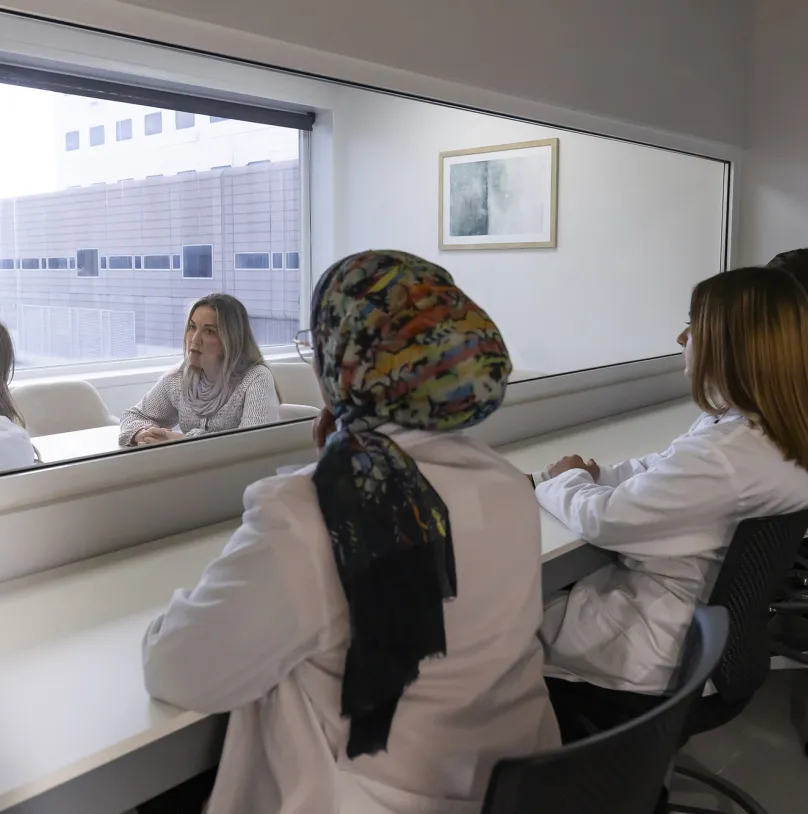 Support Clinic: Comprehensive psychological care
Support Clinic: Comprehensive psychological careThe University Support Clinic offers psychological and psychiatric care for all ages. With affordable fees, it combines social commitment with practical training, allowing students to observe real cases from the first year.
-
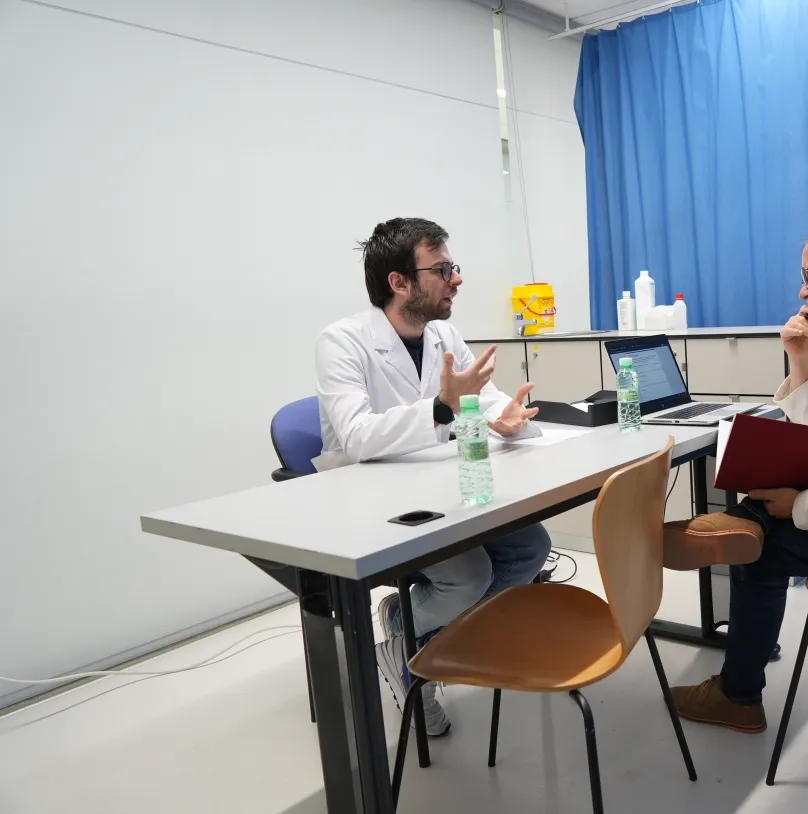 CISA: Simulation for clinical training
CISA: Simulation for clinical trainingThe Integral Advanced Simulation Center provides a safe and realistic environment where students can train clinical skills, practice psychological assessments, and prepare for professional scenarios using cutting-edge technology.
-
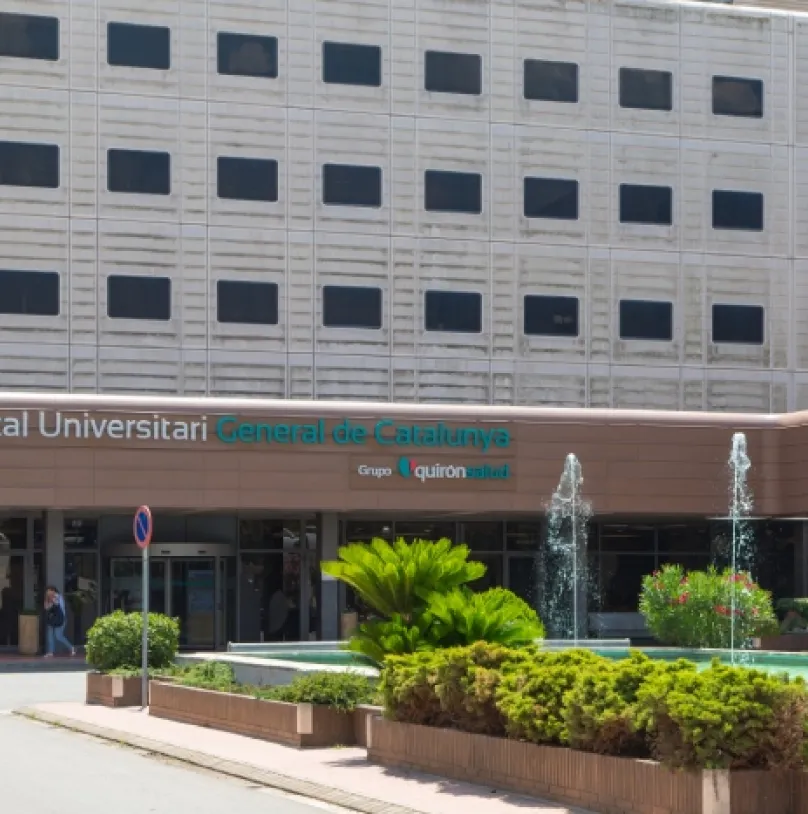 Hospital General de Catalunya and UIC Barcelona
Hospital General de Catalunya and UIC BarcelonaIntegration with the Hospital General de Catalunya allows students to experience full clinical immersion, facilitating the application of psychological knowledge in a hospital setting and promoting advanced practical training.
-
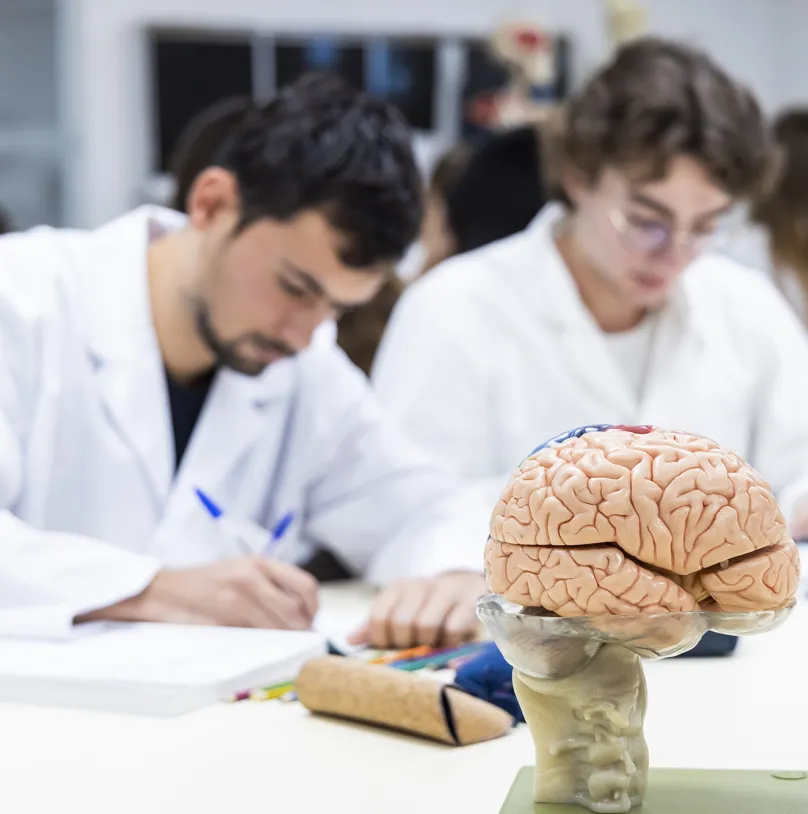 Research-equipped laboratories
Research-equipped laboratoriesUIC Barcelona’s laboratories are designed to enhance practical learning in neuroscience, psychophysiology, and psychological assessment, providing the necessary tools for research and behavioral analysis.
-
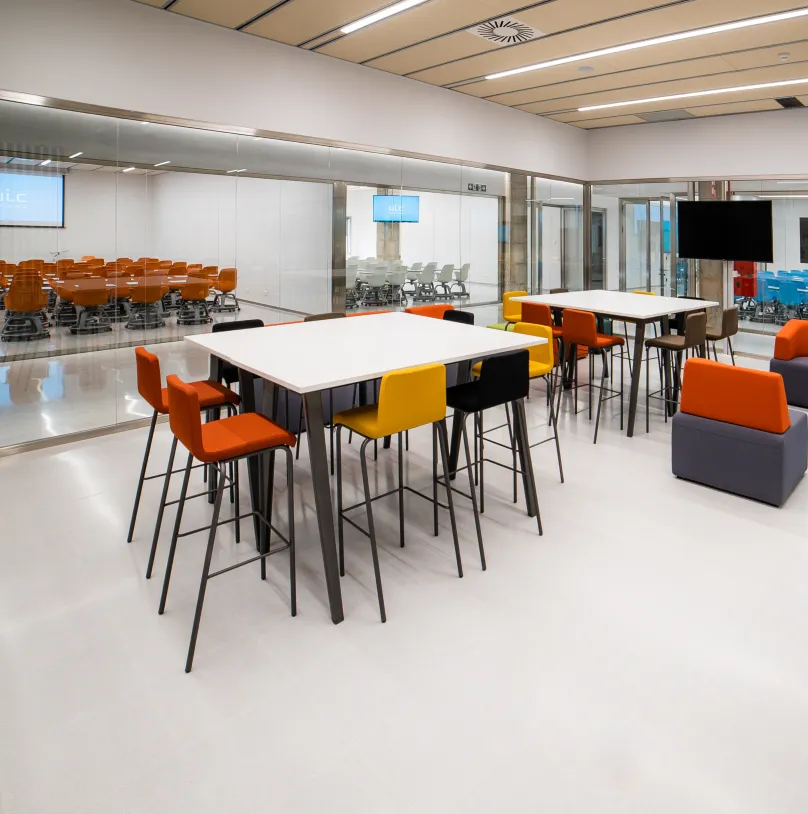 Classrooms and active learning spaces
Classrooms and active learning spacesThe Psychology Degree classrooms are designed to encourage interaction and practice-based learning. Equipped with technology and adapted spaces, they facilitate group work, debates, and clinical case resolution.
-
 Library: Specialized academic resources
Library: Specialized academic resourcesThe Health Campus library provides access to an extensive collection of books, scientific journals, and psychology databases, offering an optimal environment for study, research, and academic development.
Professional Career
Prepare for more career opportunities
With the Degree in Psychology you will have a wide range of career options.
- PIR (Resident Psychologist)
- Private Sector or Healthcare Third Sector Psychologist
- Gerontologist
- Researcher
- Social Researcher
- Human Resources/Business Consultant
- Third Sector Technician (Master's in Social, Community and International Cooperation Psychology)
- Social Work Adviser
- Physical Activity and Sports Psychology
- Criminologist, Forensic and Penal Psychologist
- Educational Guidance Counsellor
- Learning Disorder Psychologist
- Speech Therapist
- Work Guidance and Training
- Teacher at Education Centres
- Teacher for Adults
Teaching team
In order to teach future professionals in the field of healthcare we have a teaching body that combines their teaching with exercising their profession in public and private hospitals and healthcare centres. They are also involved in important research activities both inside and outside the university. Direct contact with professional practice allows our professors and lecturers to transmit a comprehensive, multidisciplinary and human overview of the reality in the sector to students.
Our teaching and research team
- a - f
- g - m
- n - r
- s - v
- w - z
Open days
Attend the next Open Day
The University is organising open days for future university students who would like to know more about our institution and the programmes we offer.
Prerequisites & admissions
Admission process for degrees
-
Request information
-
Application for admission
- Delivery of documentation
- Validation of documentation
- Payment of processing fees
-
Entrance exam results
-
Admissions
- Admissions
- Admission pending BEA Grant
- Admission with BEA Grant
- On hold
- No admission
-
Admissions
-
Deposit paid
-
Enrolment
Between June and September
- Tuition paid
-
Welcome
You are now part of UIC Barcelona
Application for admission
To apply for the Bachelor's Degree in Psychology at UIC Barcelona, you must complete an admission application form. Once submitted, a program advisor will contact you to assist and guide you through the process.
Elisabet Ungría
eungria@uic.es
Entrance Examinations
After submitting your application you are required to take an entrance exam on our Barcelona Campus. You may take it at any one of the available times.
Required documentation
Check out the documentation you need to be admitted to UIC Barcelona. We believe there are many ways to start your new life at university. Click on the following link for all necessary information:
Reservation and enrolment
If you have received an acceptance letter, all you need to do is pay 20% of the full cost of the first year. Once your enrolment is complete, you must pay the remaining 80% in one lump sum.
Acces routes
How can I access UIC Barcelona? Click on the following link for information on all possible routes.
Recognition and transfer of credits
Prices, grants and financial aid
Price
Grants
UIC Barcelona offers various fellowships supported by both public institutes (MEC or AGUAR), as well as private UIC Barcelona funds.
For further information, please check with our admissions department:
Other grants
Those seeking undergraduate degrees at UIC Barcelona may be, also, eligible for other different grants.
Financial aid
UIC Barcelona is committed to ensuring that nobody with a true aptitude and zest for learning should have to drop out of a degree for financial reasons. Student Services offers information and personalised assistance so that students can access these grants and financial aid.
FAQ
FAQsGeneral information about the bachelor’s degree
- How many places are available in the Bachelor’s Degree in Psychology?
60 places, including places reserved for double degrees.
- How much does the first year of the Bachelor’s Degree in Psychology cost?
Please visit uic.es/salud for the most up-to-date information.
- Do students need to buy books for classes?
Not necessarily, all teaching materials are available on the University’s digital platform and in the library.
- What type of grants or financial aid can I obtain to study Psychology at UIC Barcelona?
You can find out all the various options including grants, discounts, and fee waivers, as well as the terms and conditions for loans on our website.
If you have an average mark of 8 or higher in your first year of upper secondary education or a 9 or higher in your first year of Higher Vocational Education and Training (CFGS), and you are currently in your second year, you are eligible for a Grant for Academic Excellence, which entitles you to an 80% discount for each year of your studies, provided that you meet the conditions of renewal.- What is the class timetable?
The classes are taught in the morning between 8.00 a.m. and 2.00 p.m. from Monday to Friday.
There may occasionally be practical classes in the afternoon and the practicums at the Support Clinic are also in the afternoon.- When do the practicums start?
Practicums in the Support Clinic begin in first year. They are conducted in small groups, observing real cases through a Gesell chamber with a unidirectional mirror.
- What professional opportunities are open to me once I finish the bachelor’s degree?
Once you have completed the bachelor’s degree, there is a wide variety of professional opportunities available. Some may need complementary training to the undergraduate degree, such as a master’s degree or public service examinations.
Examples of professional opportunities:- Clinical and Health Psychology.
- Educational Psychology.
- Work and Organisational Psychology.
- Community Psychology.
- Psychology of Physical Activity and Sports.
- Forensic Psychology
Access routes to the bachelor’s degree programme
- Can I apply for the entrance examinations if I have a social baccalaureate qualification?
Yes.
- Can I take the entrance examinations if I have taken a Higher Level Vocational Training Course (CFGS) not related to health?
Yes.
- Are any of my subjects recognised if I have started university studies CFGS in the area of health?
If you have begun but not finished your studies or have requested an academic record transfer, you may request that your previous academic merits be recognised once you have been accepted. The faculty will study the credit recognition based on the case of each student and the curriculum of the subjects taken. If you have been admitted via the CFGS access route, subjects will not be recognised.
- If I already have a university degree, do I still need to take the entrance exams?
Yes, to gain admission into the Bachelor’s Degree in Psychology, you must take the entrance exams regardless of your situation.
Admissions tests and process
- Is there a cut-off mark for admission into the bachelor’s degree?
As this is a private university, there is no cut-off requirement. Admission into the bachelor’s degree will depend on the outcome of the relevant entrance exams from our university. There is no cut-off mark for any access route.
- What do the entrance exams involve?
The tests are online and consist of:
- Specific linguistic competence test: comprehension and writing.
- Personal interview.
- Can I choose the date of the entrance exam?
You can ask for a specific date, however you must wait from confirmation from the Information and Admissions Service who, once they have looked over your documentation, will confirm the exam dates via email.
- What are the exam times?
The specific test starts at 9 a.m. and lasts approximately 1 hour.
The interview can be the same day or a few days before or after the specific test. It has a duration of 10 minutes and is scheduled according to the candidates being examined.- Is the exam a multiple choice test?
The specific test includes both multiple choice questions and short-answer questions.
- When will I find out the results of the entrance exams?
The results will be sent to you by e-mail approximately 7 to 10 working days after sitting the exams.
- If I am ‘not admitted’ can I attend the next sitting during the same academic year?
No, you can only attend one sitting per academic year.
- If I am on the waiting list, when will I find out the final results?
The waiting list is reviewed in each call for admission and will be closed in September. It is determined by numerical classification, guaranteeing absolute impartiality.
- If I have been admitted what is the next step?
You will receive a letter of admission containing information about the next steps to take in order to reserve your place. You can check the payment conditions on our uic.es/psicologia.
- If I reserve a place and then decide not to study at UIC Barcelona, will the reservation fee be reimbursed?
The reservation fee will only be fully reimbursed in event you do not pass your upper secondary studies or the Spanish university entrance exams (PAU). This clause is laid out in the general terms and conditions.
International mobility
Study abroad temporarily
As a student in this degree programme, you may complete part of your degree or a work experience placement abroad and receive academic recognition.
Spend a semester or a full academic year at one of your Faculty’s partner universities or find a company abroad to do an internship. You may also:
- Attend the Berkeley Summer Sessions (extracurricular activity) the world’s best public university.
For information about everything you need to do before, during and after your mobility stay, check out the "Study abroad" section and download all the documentation specific to your Faculty:
Mobility oportunities and requisites
Alumni Ambassador
The Alumni Ambassadors are volunteer alumni who will explain their experience at UIC Barcelona to you. With them you will be able to resolve any doubts that may arise about the chosen program, the University and your experience as a student.
What questions can you ask an Alumni Ambassador?
- What do you value most about this program?
- What profile of students studied it?
- What do you think about teachers?
- What professional practices did you do?
- What are the advantages of studying in Barcelona?
- If he/she already has a job and if he had a hard time finding one.
Don't miss this magnificent opportunity to learn first-hand what it means to do a program at UIC Barcelona and the value it brings you in the development of your career. If you have any specific questions about the admission process, scholarships, visas or financial aid, you can contact directly admisiones@uic.es.
